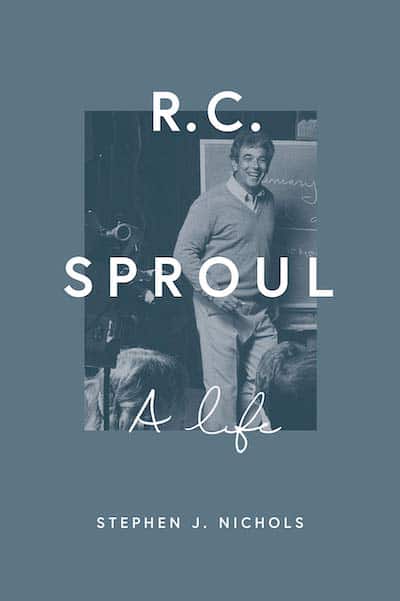A theologically informative but beautiful and engaging biography of R. C. Sproul.
Synopsis:

Stephen Nichols, president of Reformation Bible College and chief academic officer of Ligonier Ministries, has written a beautiful and instructive tribute to R. C. Sproul’s life and legacy. Sproul grows up within the throes of a multi-generational family business, the liberal church, and WWII. He had a happy childhood where he succeeded in sports and vacationed in Ontario, Canada. In high school, his father had a stroke. Sproul took on caretaking responsibilities, a part-time job, sports, and school. Vesta, his one-day wife, was his stability through high school, the death of his father, and college. Sproul went to Westminister College on a sports scholarship and by chance was invited to a Bible study. There he was saved by Ecclesiastes 11:13 and switched to become a Bible major. This was the beginning of his theological training as he went on to multiple seminaries and even overseas to study the Bible. Though his college and seminary choices often leaned liberal, he always found professors who stood firm in Biblical teaching and orthodoxy.
He became a teacher of seminary himself and then founded “The Ligonier Study Center” where he taught normal joe-shmoes theology. He loved theology and impressed it upon his students because believing that “truth invokes passion.” Through this ministry his reach expanded into “Tabletalk Magazine,” and numerous video lectures, conferences, and books. He is especially known for promoting the doctrine of God’s holiness because when “the keystone of the doctrine of God is in place–and honored–then all other doctrines will fall into place (p. 177).” Ultimately he is among those considered “battlefield theologians.” He, like others before him, fought for doctrinal precision, a high view of God, the inerrancy of scripture, and the doctrines of grace. He fought against movements that undermined the gospel, scripture, and God’s character. He sought to please God and preserve the purity of God’s word within the church, even when it cost him.
Personal Thoughts:
While I had heard many things about R. C. Sproul, I did not have a deep view of his life, ministry, and beliefs. I greatly enjoyed this book and learning more about this man of God. I was also impressed by the amount of teaching that this biography brings to the table. From this text, I have R. C. Sproul as an example of standing for the truth and precise biblical thinking. I also now understand the main concepts which drove his teachings and beliefs. Concepts that are challenging and growing for me personally. Things such as viewing God as not only holy but otherly perfect to the point where it should invoke fear and awe. The importance of biblical precision. The 5 sola’s as categories in which to discern truth from error. The further importance of understanding God. The essential nature of justification and imputation to the gospel. The importance of understanding that “right now counts forever” and “ideas have consequences.”
I would highly recommend R. C. Sproul: A Life for personal reading. While there are deep theological concepts within the text, both Sproul and Nichols do a great job of articulating them. It is highly encouraging. This could perhaps be used in a summer book club or for church leadership to go through together. There is a large amount of theological material within the text that would prompt great discussion and questions. For a biography, it is quite practical, and the concepts that Sproul champions are timely and important today. It is probably too theological for those who are starting out in understanding theology and may feel out of touch in regards to personal application for other readers due to the unique ministry and life Sproul had.
Favorite Quotes:
“The secret to happiness is found in obedience to God…thus the top and the tail of it is that happiness cannot be fully discovered as long as we remain ignorant of God’s word.” – p. 122
“Real perfection does not admit to degrees. Something that is truly perfect in every respect cannot become more perfect or most perfect. We speak like this because we have become accustomed to dealing with things that are imperfect. Imperfect things can be improved, but the perfect cannot.” – p. 172
“The sovereignty of God is not particularly Calvinist or Presbyterian. It belongs to theism; it is ‘a necessary tenant of theism.’ As he would say, ‘If God is not soverign, then God is not God'” – p. 180

Add a Comment